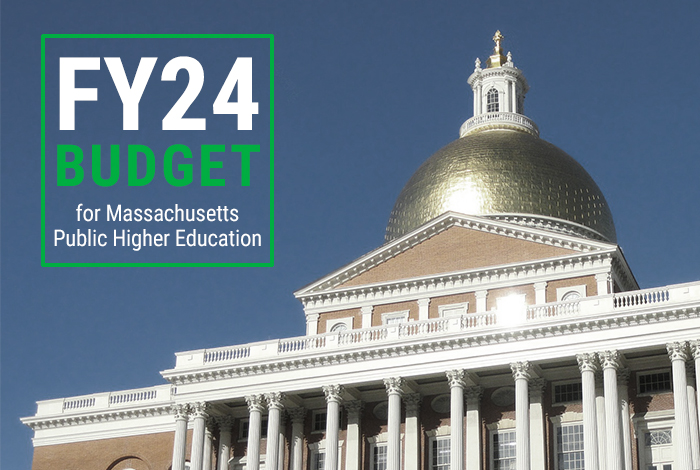
The upcoming fiscal year represents a rare opportunity to fundamentally reimagine how public higher education is financed in Massachusetts and to significantly support the transformation of the system to focus on educational equity. With the recent passage of the Fair Share Amendment, Massachusetts is expected to receive considerable new income tax revenue that is anticipated to exceed $1 billion annually. The Fair Share Amendment explicitly named “public colleges and universities” as one of the areas to which the added revenues would be devoted. Students attending public institutions of higher education are poised to benefit greatly from the addition of new monies as soon as this fall.
At its meeting on February 14, 2023, the Board of Higher Education approved a series of budget recommendations for Fiscal Year 2024. The Board’s proposal called for the infusion of $500M in new dollars into the Commonwealth’s system of public higher education in alignment with the Framework for Strategic Public Higher Education Financing.
College affordability is a challenge all too well understood by many students and families. In approaching the issue, the BHE was committed to three principles:
Informed by these, the Board’s budget recommendation more than doubles the amount of state financial aid available to Massachusetts’ students. Effective implementation of this expansion will be vitally important. DHE will work with stakeholders to inform that process with the goal of ensuring that financial aid resources will help address systemic workforce challenges including improving the pipeline of diverse educators and other high-priority occupations in the Commonwealth.
The Board also recommended establishing new fund to support socio-economically disadvantaged students in the Massachusetts public higher education system. Comprehensive wraparound support services are critical to improving completion rates among the Commonwealth’s most marginalized students. Additional resources would enable expanded access to proven students supports such as early momentum structures, experiential learning, sustained support services, integrated career education, and faculty engagement and pedagogy.
In addition, the BHE recommended increasing funding for the SUCCESS program and increasing resources for Early College. Early College has been shown to be successful in removing barriers faced by high school students who have been historically and consistently excluded from and/or subject to significant barriers to college participation, matriculation, and graduation.
Increased funding for innovations and collaborations that support greater effectiveness, efficiency, and collaboration in our higher education system was also included in the BHE’s proposal. Since its inception, grants from the Performance Management Set Aside line item, now known as the Higher Education Innovation Fund (HEIF), have been used to seed and support new innovations and evidence-based practices in public higher education. HEIF fosters collaboration and has resourced several systemwide initiatives, including the adoption of open educational resources, development of a seamless system of transfer, expansion of competence-based education and prior learning assessment, and adoption of analytics technology.
Equally important, the funds support institutional implementation of policies and programs that are actively transforming institutional cultures to be equity-minded, reimagining and building culturally relevant and civically engaged educational experiences for all learners, and preparing students, particularly learners from marginalized populations, to thrive beyond their time in public postsecondary education.
The BHE’s budget also called for providing institutions with consistent, reliable base funding to effectively operate and position them to better meet the mission of the system of public higher education. Any funding structure must consider the system’s significant labor costs. The BHE recommended the Commonwealth codify the commitment to annually fund the full costs for all collective bargaining agreements, and equitable sharing of personnel costs between the Commonwealth and public higher education institutions.
Finally, in addition to these high-level strategic priorities, the Board recommended maintaining funding levels, at minimum, for all other Department budgetary line items, and supported total maintenance funding for the State Universities and Community Colleges, including a 3% increase distributed through a performance-based funding formula.
These recommendations will be considered by the Executive Office of Education and the Governor’s Office as they prepare the Governor’s Budget Recommendation for all of state government.